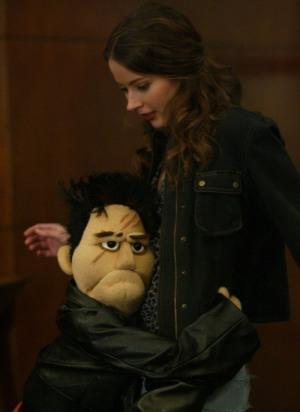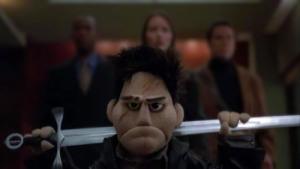In tonight’s new episode of Community, the Greendale 7 get in touch with their felt side. Okay, that sounded weird. I mean they are going to be turned into puppets.


The Greendale 7 will go on a camping trip, encounter guest star Jason Alexander, and encounter something so traumatic they can only remember it as if they were puppets at the time.
This puppet humor is in keeping with recent (Neil’s Puppet Dreams) and upcoming projects (The Muppets…Again!, Happytime Murders) and the continued presence of the Sesame Street-spoofing musical Avenue Q Off-Broadway in New York. However, Community is going to turn human characters into puppets as opposed to strictly having human characters interacting with puppets. That’s kind of new. 30 Rock did something similar, in a far more limited fashion, when Kenneth saw the world in puppet form. However, the gold standard is and probably will continue to be the masterful season 5 episode of Joss Whedon’s Angel: “Smile Time,” in which David Boreanaz’ lead character is turned into “a wee-little puppet man.”

See that Community? Why aren’t any of your puppets as perfect and adorable as the puppet version of David Boreanaz?
“Smile Time” was the 14th episode of the 5th season and final season of Angel, featuring a an evil Sesame Street headed by 4 demons pretending to be the puppet stars of the show. The genius to turn Angel into a puppet came from show-creator Joss Whedon, whose father Tom Whedon was a writer for The Muppet Show. The plot of the episode involves a popular children’s television named “Smile Time” which has been overtaken by four demons posing as the puppet stars of the show. They have kept the show’s creator alive simply to use him as their own human puppet, and they are using the show to suck the life force out of its youthful audience. When one too many catatonic kid shows up in the hospital wearing a far-too wide smile, ala a victim of the Joker in Batman, the case comes to the attention of Angel and his team. When Angel goes to the television studio to investigate he discovers a mysterious orb which magically transforms him into a puppet, thus beginning one of the funniest and best hours of television from a Joss Whedon show.
Here is how his friends find out about his puppet-ification:
The show had previously punctured Angel’s rather affected mannerisms in the season 2 episode “Guise Will Be Guise,” which is equally brilliant. Here, how can Angel maintain his persona of broody, troubled guy when he is made of felt, cannot even operate a remote control with his fingers, and has a removable nose? Moreover, Angel was (and continues to be in the comic books) a character at a complete loss when it came to expressing his emotions. However, as a puppet his emotions are affected, producing a manic streak in which he will express righteous anger one second and immense love and gratitude the next.

She’s as surprised as us. Angel, when not a puppet, was not a big hugger.
He is, of course, loathe to admit to anyone outside of his inner circle that he has become a puppet. He even takes to hiding under his own desk so as not to allow his would-be girlfriend, Nina the werewolf, to see him. Of course, when his frenemy, Spike, walks in, well, the entire office finds out about Angel’s puppet-status in a hilarious fight scene:
Even for a genre show like Angel, the notion of turning a character into a literal felt puppet could perhaps be a gimmick too far. Joss Whedon and episode writer/director Bed Edlund were able to make it work through a combination of character development and story arc advancement. At the point “Smile Time” enters in the fifth season, Angel has been made the head of an evil law firm, which he naively believes he can take down from the inside. In prior episodes, both Spike and Cordelia have insisted that Angel has become a mere puppet in a system outside of his control, something which he is beginning to believe as well. Then he is turned into a literal puppet. Subtle, it ain’t.
At a time when Angel is concerned over his ineffectual hero status he is turned into a puppet whose nose comes off, and he cannot successfully defend himself when his would-be werewolf girlfriend attacks while he was in the middle of his big epiphany speech and hadn’t noticed her transformation. He ultimately comes to terms with his feelings for Nina, his hirsute would-be girlfriend, and chooses to pursue her romantically as well as pledge to be more present and aware in his own life. The puppet story line is merely a use of a form – here it is the puppet, on Buffy it was a musical (“Once More With Feeling”) or a silent movie (“Hush”) – which functions to illuminate something about the characters which could not be otherwise accomplished. Moreover, the seeming innocuous song about self-esteem from the TV show “Smile Time” ends up speaking to qualities lacking in both Angel and Wesley at that time, thus the reason the song plays the episode out to its credits after both male protagonists have shown some self-esteem:
Far more happens in the episode than simply poking fun at our notions of Angel. The long-simmering romance between Fred and Wesley finally comes to a boil in the episode’s final moments, and Gunn makes his own deal with the devil which ultimately sets it into action the hell that awaits all of the characters in the season’s second half. In fact, considering the brutal death awaiting Fred in one week’s time this episode finished with one of her final happy moments alive.
The show even manages a Community-level meta commentary with a direct spoof of its own conventional method of hero depiction. Both Buffy and Angel were incredibly fond of the heroic group shout, in which the characters forcefully walked toward the camera being led by the star of the show and thus leader of the team (Buffy for her show, Angel for his). This is the shot that precedes the one final shot of the hero in the opening credits for the respective shows.


Among the current slate of televisions shows, it is not surprising that Community would be among the few to follow Angel and 30 Rock’s lead. Community has built its reputation on genre pastiche, with classic episodes nodding toward Die Hard, Goodfellas, Apollo 13, Star Wars, and generic spaghetti westerns. So why not add The Muppets to the list. However, because Community is a show based in reality, albeit a cartoon-y, sitcom reality, it cannot fall back on science-fiction or fantasy excuses for the fantastical the way Angel could. As such, how do they get away with such flights of fancy? They always attempt to structure the episode around a central story which grounds everything in reality and advances the overall story of the season, the classic example being Jeff and Britta finally hooking up in “Modern Warfare” (i.e., the Die Hard homage) and thus completing a season-long story arc which then bears huge ramifications for the season finale. Hopefully, they manage that feat of storytelling again with their puppet episode. Otherwise, just because it’s quirky and the Jim Henson Company people are nice is not a good enough reason.
Want to own a copy of the plush Angel puppet? Seriously, how could you not? He’s adorable! Well, you can find one through E-Bay, or in the merchandise section of a sci-fi convention like Dragon Con. The problem? The replica puppets are limited editions, and will cost you a pretty penny. There are, at least, a variety of options. Toy company Diamond Select produced three different versions of Angel (normal, battle-tested, and in full-on vamp mode) as well as a version of Spike as he appears in Shadow Puppet, a comic book follow-up in which a Japanese version of the show Smile Time turns Spike into a puppet.
The below video is a feature about “Smile Time” from the season 5 DVD. The puppeteers are interviewed, with the ones who operate and voice the main characters in the episode being Victor Yerrid as Polo, Drew Massey as Angel, Julianne Buescher as Flora, and Tim Blaney Groofus. Interestingly, Blaney’s is a voice you’ve likely heard before, as he was the voice of Johnny 5 in the Short Circuit movies (“No disassemble!”) and Frank the Pug in the first two Men in Black films.
If you have yet to see “Smile Time”, just stop what you are doing right now and go watch it on Netflix or Amazon Prime or Hulu. In fact, when I first saw it my best friend who had seen the entire series before I came to it insisted I wait until she was around to watch “Smile Time,” as it is best enjoyed with company because you will laugh together.

